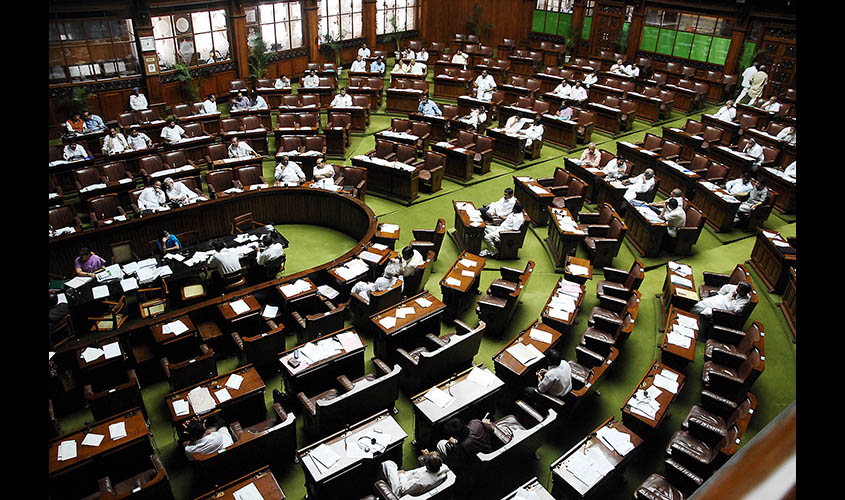‘Discussion would allow the Opposition to tear into various tall claims’.
The inordinate delay in paying heed to the No Confidence motion moved in Lok Sabha by the YSR Congress and the Telugu Desam Party against the Narendra Modi-led National Democratic Alliance government at the Centre reflects poorly on the Speaker of the august House. In a democracy, the No Confidence motion is an instrument provided to the members to question the stand of the ruling dispensation as well as to highlight the positions of various parties on crucial decisions and policies enunciated by the Council of Ministers.
Therefore, it is of paramount importance that any such motion should be dealt with while superseding all other issues in the Lok Sabha, provided there are no procedural lapses. The notice for the motion can be served if there are at least 50 members supporting it. The Speaker has to then ascertain if the stipulated number also stand up in their seats and back such a move, thereby paving the way for a threadbare debate on matters confronting the country. The convention has been, that once the No Confidence motion is tabled, it should be taken up without any delay; with the presiding officer allotting the date and time for the discussion.
In the present case, while Parliament is on, the Speaker has been creating this impression that since the House was not being allowed to function in an orderly manner, she was finding it impossible to take cognisance of the significant matter. Under the rules, the Speaker enjoys enormous powers and can readily get the well of the Lok Sabha cleared by either inducting marshals to bodily remove the errant members or by suspending them for not allowing the protocol of business. Therefore, if no action has been taken against the AIADMK and TRS members agitating vocally, it is because apparently neither the Treasury Benches nor the Chair wish the proceedings to go any further.
Instead, an erroneous impression is being given that the “helpless” Speaker and the House were, by a small section of members, being held to ransom, thus raising serious questions regarding the intent of the government. If the Finance Bill and the Union Budget could be passed amidst all the commotion without any discussion, how can the Speaker now claim that disruptions were responsible for the motion not being brought up?
Questions may be asked, as to why would the BJP and its partners, shy away from the debate, which they were sure of winning given the numbers. Even after the TDP walked out of the alliance, the NDA has nearly 315 members including 274 of the BJP alone, which was far above the half-way mark. Thus what is the government running away from?
It is true that once the debate commences, several inconvenient matters such as agricultural distress, rising unemployment, poor economy, the sale of Rafale aircraft and the under-preparedness of the armed forces, as referred to by the Vice Army Chief recently, would all come to fore. The discussion would allow the Opposition to tear into the various tall claims, and compel the Treasury Benches to come on record with substantial answers. The government’s accountability would be on line, as it allays the concerns of the common man regarding points raised by Opposition leaders.
Evidently the Prime Minister, who is the fulcrum on which the government rests, and a fiery and combative leader at that, can utilise the occasion to rip into the Opposition while concurrently highlighting the inadequacies of several state governments run by his opponents. He could also showcase them as being power-hungry, opportunistic and disruptive. He can easily wield the baton to demonstrate his hold over the House.
However, what has put the BJP on tenterhooks is that at the end of the debate, a division of votes would show the dwindling numbers of the alliance. The TDP is out, but it would be politically significant to watch whether other allies, such as the Shiv Sena, the PDP and the Shiromani Akali Dal, vote alongside the BJP or would prefer to abstain. It would as well reveal how the AIADMK and the TRS, which are being used as a shield to prevent the no confidence motion, decide to vote. In fact, the political ramifications of the voting would be not as much in the government’s victory, as it would be on how its associates were viewing its performance. It is clear, that if the common perception is not in favour of some of the major policies of the government, it would reflect in the behaviour of the allies, as well as those who would prefer to sit on the fence, to buy some more time before the next Parliamentary elections.
The no confidence motion would be the best yardstick to judge the state of the nation. At least it would be far more credible than surveys conducted one after the other by TV channels so as to provide a high rating to the incumbent government. The BJP itself has been showing its apprehensions, which were indicated when Amit Shah, in a recent interview spoke about the NDA getting at least 300 seats and not 400, as he and some of his colleagues earlier used to emphatically claim.
Therefore, Madam Speaker, it is for you to call the Opposition’s bluff, and permit the entire country for itself to see the truth. Obviously, the ball is in your court. Between us.

